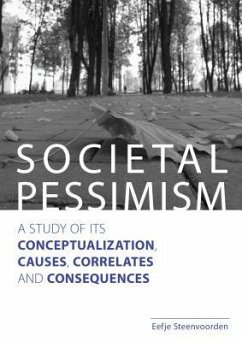What explains the concern about the state of society among citizens? In recent years, the public debate in many Western countries has discussed the sentiment that society is heading in the wrong direction. Yet little is really known about this attitude. This dissertation aims to further our knowledge of the concern about society in contemporary Western countries. It revolves around three overarching questions: What is the concern about the state of society, what are the causes of this concern, what are its consequences? The study presents a new conceptualization of this attitude by defining two concepts: societal pessimism and societal unease. While the former describes the concern about the state of society in a universally applicable manner, the latter focuses on this sentiment in Western countries specifically. Measures of these two concepts are developed and validated so that they can be used in future research. In addition, this study explores which groups of citizens are particularly societally pessimistic, how the concern about society differs from other social concepts, and how it is expressed in people's own words. In terms of causes, this book questions whether societal pessimism is a cultural characteristic of Western societies, or is instead rooted in actual societal degradation. The results point to the latter, showing that political and economic factors drive societal pessimism, both cross-nationally and longitudinally. Finally, this book underlines that societal pessimism is not without consequences, by showing its relationship with attitudes and behaviors that are vital for the functioning of democracy. Societal pessimism increases the chance of voting for populist radical right parties, inhibits identification with multiple political-geographic groups concurrently, and is associated with higher protest participation but lower institutional political participation and civic participation.
Hinweis: Dieser Artikel kann nur an eine deutsche Lieferadresse ausgeliefert werden.
Hinweis: Dieser Artikel kann nur an eine deutsche Lieferadresse ausgeliefert werden.








